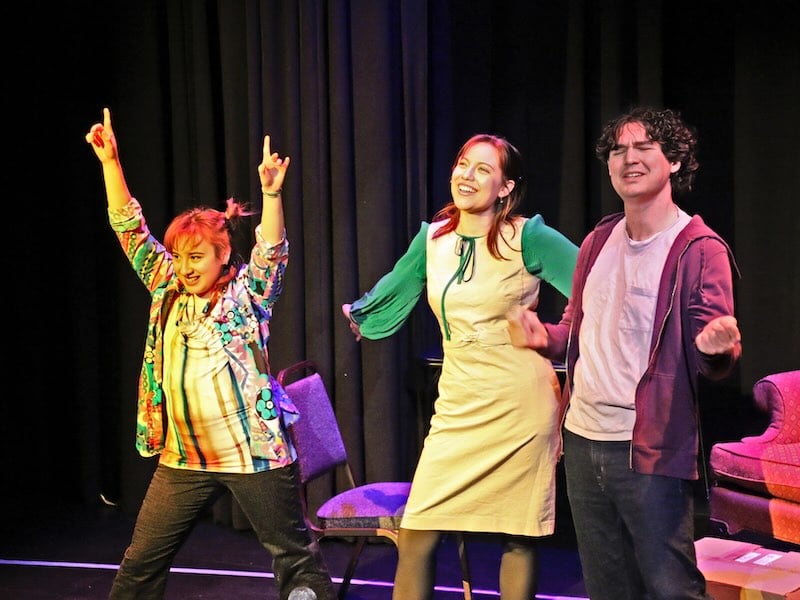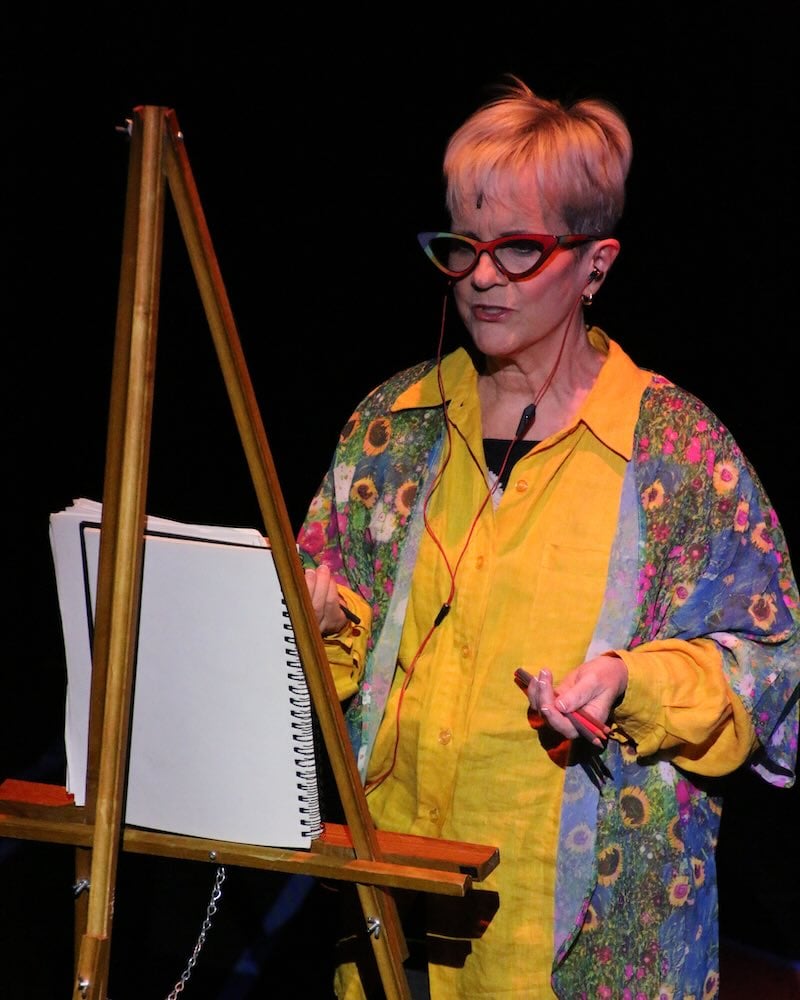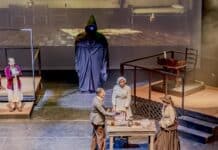Life is filled with inflection points that challenge us to reaffirm, choose, or create who we are time and time again. In the case of the three women of the Kirby family, that means three inflection points at the same time. High school senior Becca Kirby balances endings and beginnings as she runs for class president to prevent the banning of books. New college graduate Abby Kirby strives to prove herself at her first job while confronting the contradictions and degradations of corporate America. And soon-to-be empty-nester Kate Kirby is faced with rediscovering herself after decades of putting others first. Woven together in an original book by Sharen Camille featuring the music of New York power pop/rock band Iridesense, Got It Good by the Bethesda Little Theatre considers the moments, choices, and beliefs that add up to who we become and what we stand up for.
A single mother trying to make it through and be there for her girls, Kate Kirby, played by Maureen Freshour, was a consistent presence of support, love, and guidance. With her clear, compassionate voice that reminded me of Carole King, you could tell that Freshour was a maternal figure on and off the stage for this production. She was also responsible for more than a few humorous moments, particularly in “Nice Try” as she churned through a cycle of cringe-worthy first dates and in “Fantasies” as she refocused herself on dreams for the future. Also responsible for the choreography of the show, Freshour looked for opportunities to move within each moment.

The eldest daughter, Abby Kirby, played by Payton Woodruff, brought a soft and sometimes self-sacrificing enthusiasm to the character. With a sweet innocence that instantly reminded me of Mandy Moore, Woodruff’s face shone, and her smile radiated to the back of the black box theater. Often at her side were friends Crush, played by the never-too-over-the-top Susanti Rodgers, and former (or should I say current) flame, Charlie, played by the mild-mannered John Lynch. Whether giving each other a supportive push as in “Lately” with Crush and Charlie or shoulder as in “Voice of Reason” with Abby and Charlie, this trio offered windows into the highs and lows of figuring out how to stand up for what you want and what you believe in within the working world.
Matching the sisterly struggle, but from within the confines of high school, was Becca Kirby, played by Charlie Tell. Deeply concerned by the efforts of the school board and her fellow classmates to ban a list of books from the school library, Becca takes matters into her own hands to protect access to all ideas and stories, no matter how challenging — as on particular display in “Believe” and “My Revelation.” Not without risk and consequences, she navigates the challenges of senior year with best friends Lola, played by the vivacious Beatrice Ieronimo, and Liam, played by the snappy Joshua Pinchback. Also, walking the high school halls were antagonist Cooper, played by Audrey Mollo, and voice of caution Toni, played by Jenny Gleason. Each brought solid performances that added depth and ideological counterpoints to the questions of the Kirby women.
Together with the rest of the cast — Dr. Arthur Glover (Stevie), Stephanie Levin (Diane), Amanda Rollins (Aubrey), and Caroline Smith DeWaal (Julia) — the ensemble gave it their all to add heart and energy to opening night. This was best on display during the striking and unsettling “Mind Control Society.” From inside the soul-crushing corporate conference room, the direction by Sharen Camille, lighting design by Matthew Cheney, and choreography by Maureen Freshour easily made for the most memorable scene in the show, recoiling from the ways corporate America treats people and the environment in pursuit of profits.

Music director Paul Rossen allowed for this creative take on a jukebox musical to test out its rhythm for the first time in front of an audience, one where characters could process their circumstances through the external music of Iridesense, as opposed to traditional musicals that rely on plot advancing musical numbers that begin from within. In Got It Good, the songs served as meditative moments for characters to further sit in and process where they are and what they are feeling.
Asking if we will walk the straight or crooked line in life (“The Line”), Got It Good by Bethesda Little Theatre is an example of the heart of what community theater does: create spaces for experimentation and exploration of the choices of life no matter how messy or imperfect. In the current cultural moment — where the enormity of upheaval, division, and harm seems overwhelmingly unjust — the ideas within Got It Good act as a reminder of the power of raising your voice in service of what you believe in and encourage moments of community and individual action as constructive outlets for frustration, anxiety, and fear. “Be the change you want to see in the world,” as the Kirby motto says, is an invitation to all of us — you never know who you might inspire, support, and become along the way.
Running Time: Approximately two hours, including one 15-minute intermission.
Got It Good plays through March 2, 2025 (Fridays and Saturdays at 8 pm; Sundays at 2:30 pm), presented by the Bethesda Little Theatre performing at the Writer’s Center (4508 Walsh St, Bethesda, MD). Purchase tickets ($28 for adults; $22 for seniors, military, and students; $18 for children) online. For more information, call 202-796-3431, email bethesdalittletheatre@gmail.com, or go to Bethesda Little Theatre’s website.
SEE ALSO:
Bethesda Little Theatre to present original musical about power of family, friends, and finding yourself (feature by Kaitlyn Gibbens, February 14, 2025)



